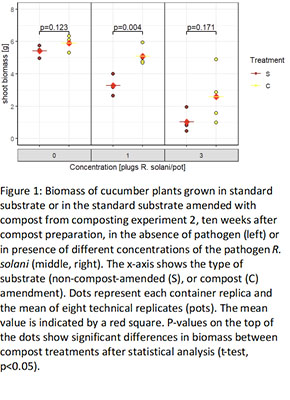The influence of different bark amendments during composting on the suppressiveness and growth promotion of composts

MSc Irene Reimann-Ortega
05/2025
Supervision: Dr. Pascale Flury (University of Basel) and Dr. Barbara Thürig (FiBL)
Abstract:
Optimal yields in agriculture can be impaired by soil-borne pathogens such as Globisporangium ultimum and Rhizoctonia solani. These cause damage such as root rot, wilting, canker-like growth or damping-off. Due to the negative effects of chemical plant protection products on living organisms and the environment, their use is increasingly being avoided. In this context, the disease-suppressing effect of composts is becoming increasingly important. It has also been observed that enriching compost with materials such bark can improve both the growth-promoting and disease-suppressing properties of the compost. In an ongoing project at the Research Institute of Organic Agriculture (FIBL) Larixyne extracted from larch bark is tested as an organic fungicide. As a by-product of Larixyne extraction, large quantities of extracted bark are produced. In this study, I investigated whether a growth-promoting and disease-suppressing substrate additive can be produced from extracted larch bark and chicken manure. Furthermore, it was investigated whether a growth-promoting and disease- suppressing substrate additive can be produced from extracted larch bark and chicken manure. Two compost experiments were carried out to answer the above questions. With each compost, suppressiveness tests were carried out in two pathogen systems: cress-G. ultimum and cucumber-R. solani. The first experiment investigated whether extracted and ground larch bark is suitable as a compost additive and whether the disease-suppressing properties of the young green waste compost can be increased by enriching it with bark. Furthermore, the effect of the bark (deciduous bark and larch bark) and the effect of bark extraction (extracted and non-extracted larch bark) on the disease- suppressing effect of the compost was investigated. The enrichment of compost with extracted larch bark had a positive effect on the biomass of the tested plants and was also able to suppress the pathogen Globisporangium ultimum in moderate concentrations. No significant differences in disease suppressive properties were found between the compost with extracted larch and the compost with non-extracted larch. Enrichment of compost with deciduous bark is more suitable for suppressing the disease symptoms of R. solani than larch bark. In a second experiment, it was investigated whether a growth-promoting and disease- suppressing substrate additive can be produced from extracted larch bark and chicken manure. It was observed that such a compost had a positive effect on the biomass of cress and cucumber plants both in the absence and presence of the pathogen, with this effect being stronger for cress plants than for cucumber plants. By enriching the peat substrate with compost, R. solani could be suppressed at moderate pathogen concentrations.
Quick Links
Social Media
